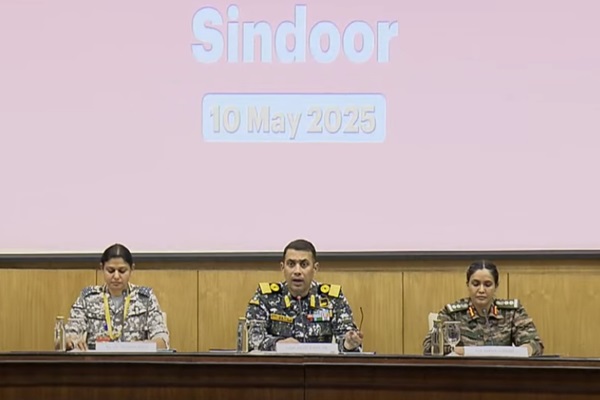.png)
India Agrees To Ceasefire, Military Asserts Pakistan Air Defence Rendered Untenable
Both sides have issued instructions to their forces to implement the ceasefire and DGMOs will speak on May 12 at noon to review the situation.

May 10, 2025 at 2:45 PM IST
India and Pakistan agreed to a ceasefire Saturday, capping three days of high-intensity military confrontation across the Line of Control and beyond. The truce was confirmed by Foreign Secretary Vikram Misri following a direct call between the Directors General of Military Operations of the two countries earlier in the afternoon.
“Director General of Military Operations of Pakistan called the Director General of Military Operations of India at 1535 hours this afternoon,” Misri said. “It was agreed between them that both sides would stop all firing and military action on land, in the air, and at sea with effect from 1700 hours IST today.”
Both sides have issued instructions to their forces to implement the ceasefire and that the DGMOs will speak again on May 12 at noon to review the situation, Misri said.
External Affairs Minister S. Jaishankar said India and Pakistan have worked out an understanding on stoppage of firing and military action. He reiterated that India maintains a firm and uncompromising stance against terrorism in all its forms and manifestations, and will continue to do so.
The ceasefire was first announced by US President Donald J. Trump, who claimed credit for brokering the agreement. “After a long night of talks mediated by the United States, I am pleased to announce that India and Pakistan have agreed to a FULL AND IMMEDIATE CEASEFIRE,” Trump posted on Truth Social.
US Secretary of State Marco Rubio later confirmed that he and Vice President JD Vance had spoken with both Indian Prime Minister Narendra Modi and Pakistani Prime Minister Shehbaz Sharif.
The breakthrough came after days of escalating military exchanges that began with Pakistan’s drone and missile incursions on May 8 and were followed by Indian precision strikes across Pakistan and Pakistan-occupied Jammu and Kashmir.
The drone incursion came close on the heels of India’s Operation Sindoor, which targeted terror infrastructure in Pakistan after the April 22 massacre of tourists in Pahalgam. While that strike was designed to be limited and non-escalatory, the events of May 7–8 reintroduced volatility along the border.
Advantage India
India’s armed forces, after the announcement of the ceasefire, said their strikes had left Pakistan’s air defences “untenable” and inflicted heavy damage on critical military infrastructure.
Retaliatory strikes targeted command-and-control centres, logistics hubs, and airbases in Skardu, Sargodha, Jacobabad, and Bholari.
In addition, the loss of air defence weapon systems and radar installations has made “the defence of Pakistani airspace untenable,” Wing Commander Vyomika Singh said.
“Extensive and precise damage has been inflicted on military infrastructure and command control centre and logistic installations has led to the complete breakdown of its defensive and offensive capability and also Pakistani morale”, she said.
India also rebutted claims made by Pakistani authorities about having destroyed high-value Indian assets. “These reports are completely false,” Singh said, referring to facilities such as the S-400 air defence system, BrahMos missile base, and airfields in Srinagar, Jammu, Pathankot, Bhuj, and Naliya.
The military also pushed back against Pakistani allegations that Indian operations had targeted religious sites.
Wing Commander Singh emphasised that India’s secular principles are deeply embedded in the ethos of its armed forces, which respect all places of worship without exception. She said military operations were strictly focused on dismantling terror infrastructure used for anti-India activities, with no religious sites targeted.
“No religious sites, I repeat, no religious sites have been targeted by the Indian armed forces over the past few days,” she said.
She emphasised that India’s actions were confined to terrorist infrastructure and sites being used for anti-India activities.
Singh briefed in English, and Colonel Sofiya Qureshi did the briefing in Hindi
Commodore Raghu Nair affirmed that Indian forces would respect the ceasefire agreement but remain on high alert. He said the Army, Navy, and Air Force are fully prepared to defend the nation’s sovereignty and integrity, and warned that any further provocation from Pakistan would be met with a strong and decisive response.
“Every misadventure by Pakistan has been met with strength and every future escalation will invite a decisive response. We remain fully operationally ready to launch whatever operations may be required in defence of the nation,” Commodore Nair said.



